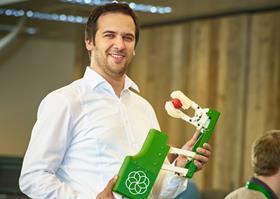
What benefits does your strawberry-picking robot bring to the berry category?
Robotics are a solution to labour shortages, and to rising wages. More importantly, robotics lead to higher product quality, with less bruising, better sorting and picking at optimal ripeness, plus increased flexibility, including the possibility of night-time picking.
Have there been any developments over the past year?
We are currently picking strawberries at a rate of one every four seconds, which is three times faster than last year. We are organising an invitation-only demonstration on 21-22 March for prospective partners. We ask companies that are interested to apply.
Will we see similar robots able to pick other berry varieties like raspberries and blueberries in the near future? Is it more difficult to automise the picking of such crops?
Optimal automation always requires changes in the way the crop is grown. We are currently exploring the possibilities for raspberries, blackberries and blueberries.
I understand you’ve done some recent trials with Belgian cooperative Hoogstraten for their strawberries? How have these trials fared?
We have tested our prototype, and are currently building a new prototype for May that will have all the base functionality, including logistics and fully automated picking. The first robots will be delivered in 2019 to the growers we are collaborating with, with interested growers also able to apply.
What has been the reaction of growers on seeing the capabilities of your robots?
Seriously, they are in awe. They clearly see the potential, and are very interested in collaborating with us.
Do you predict any future issues regarding increasing automation in produce? Do you envisage the need for a universal basic income in the future? Or do you see robots merely addressing future worker shortages?
A universal basic income is a political matter, and not our place to comment. However, robotics in agriculture will have no impact on jobs. On the contrary, robots will replace jobs that are unsustainable and that involve people travelling thousands of miles and living in shacks.
Because of robots, farmers will have higher requirements for the remaining pickers, in terms of crop monitoring. The job of the remaining pickers will also become more varied, leading to more local people being employed on farms again. Immigrants working on the farms today will find plenty of jobs in their home countries, where economies are booming. Moreover, it will take some years before robots penetrate the whole market.






No comments yet